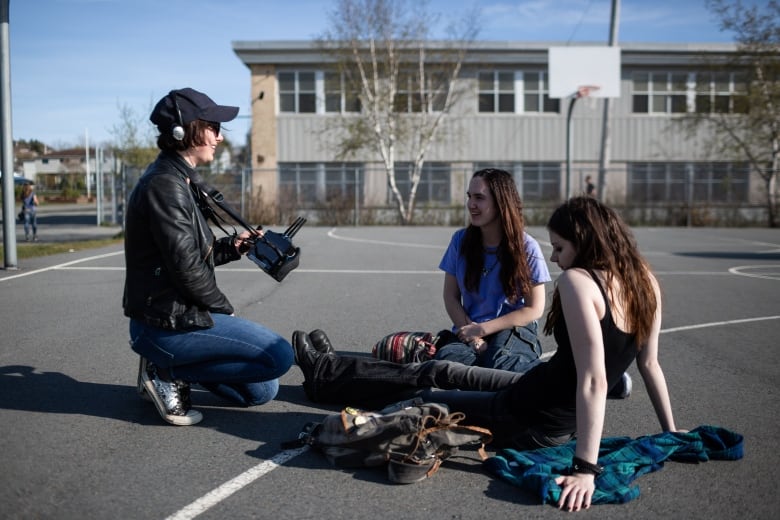
Megan Park is not the only one tired of coming-of-age stories told by men.
The Ontario director’s latest film My Old Ass, getting its wide theatre release Friday, is part of a recent wave of films in the genre starring and directed by women.
“I think people are just sick of hearing stories about men,” Park told CBC’s Makda Ghebreslassie. “We’ve seen them, they’ve had their time.”
The movie centres around 18-year-old Elliott, played by Maisy Stella, as a birthday mushroom trip leads to an encounter with her 39-year-old self, played by Aubrey Plaza, who gives her life-changing advice.
Shot and set in Muskoka, Ont., where Park spent her summers as a kid, she says the idea came from thinking back to her childhood and the idea of doing things for the last time.
“I think about the last time I made dance videos with my friends to Spice Girls songs, and I didn’t know it was the last time I’d ever do it. If I could go back and tell myself it was the last time, would I appreciate it more, or would it just ruin it? Is this the way that life is supposed to be?” she said. “It was that question that made me get into this idea.”
As the cheeky title suggests, Park intended to ultimately make a heartfelt, feel-good film that balances out the “heaviness” of the questions it explores. While the film is not autobiographical, she says there’s part of her in every character.
WATCH | My Old Ass trailer:
Women directors still rare in Hollywood
Women directors are still a rarity in Hollywood. A University of Southern California Annenberg study released in August examining inequality in popular films found only 123 of 1,700 top-grossing films between 2007 and 2023 were directed by women. Last year, women only accounted for 12.1 per cent of directors and 15.2 per cent of writers.
Stacy Lee Kong, a Toronto-based culture critic and founder of media brand Friday Things, says it’s been a joy to see Canadian films like My Old Ass and Durga Chew-Bose’s Bonjour Tristesse — which screened at this year’s Toronto International Film Festival (TIFF) — bringing a broader perspective to the historically male-dominated coming-of-age genre.
“There’s still something really powerful in seeing what’s happening right now, which is that we’re getting more and more of those stories from different perspectives,” Kong said.
“Women haven’t had a chance to tell those stories. We haven’t had a chance to delve into the richness of what it’s like to balance competing desires and our family responsibilities,” she said. “We haven’t had a chance to tell real stories about those experiences, and especially not ones that allow us to grapple with complexity and nuance and even morality.”
Nova Scotia director Stephanie Joline explored coming-of-age themes in her 2022 debut feature film Night Blooms, which tells the story of a teenage girl from a dysfunctional family who has an affair with her best friend’s dad. The film reflects her own childhood experience, revolving around girls getting into trouble as they grow up in the 1990s.

Joline says having more people from different walks of life telling their stories feeds compassion and understanding among audiences, and she believes the authenticity comes across on screen when the writer truly knows the world they’re portraying.
“We are a diverse country and a lot of us want to see ourselves represented on the screen. So when we have the history of it only coming from one point of view for so many years, it can be disheartening,” she said.
More on-screen diversity ‘better for everybody’
Joline, who has Inuit and Acadian background, names Canadian TV show Don’t Even, about Indigenous teens in Winnipeg, as something she wishes she could’ve seen when she was younger.
Grateful for the recent proliferation of stories told from more diverse perspectives, she says the media we consume plays a role in forming who we are and how we think from an early age, to a greater degree than we might want to admit.
“The more we can reflect the real, true diversity of our country on screen, I just think that it’s better for everybody to get to see that more and more. And then people don’t feel as alone, people don’t feel as scared to tell their stories,” she said.
Canadian filmmaker Molly McGynn’s new dramedy Fitting In reaches into her own past. When McGynn was 16, she found out she had a rare medical condition known as MRKH. She hopes the movie will help others diagnosed with it to feel less alone.
Other acclaimed Canadian coming-of-age films that made a splash last year include The Queen of My Dreams, directed by Fawzia Mirza, about a Pakistani woman and her Canadian-born daughter growing up in two different eras, and Molly McGlynn’s Fitting In, which centres on a 16-year-old girl diagnosed with a rare reproductive disorder.
American director Kim O. Nguyen, whose coming-of-age comedy Prom Dates came out in May, says audiences are proving they will show up for these stories.
“The stories are there, the creativity is there, the success is there, the metrics are there,” she said. “It’s a growing momentum right now.”
Nguyen, who was born in Vietnam and raised in Chicago, says 2023 films Bottoms and Joyride and the Oscar-nominated 2017 film Lady Bird are some of her favourite recent female-centred coming-of-age stories.
With Prom Dates, a story about two teenage girls who try to salvage their prom night after they both break up with their dates the day before, Nguyen says she wanted a comedy that focused on friendship and real human characters who are smart but still make bad choices.
WATCH | The official trailer for Prom Dates:
“This is definitely a film I would have loved to have had growing up — especially films where female characters are messy and they’re complex and they’re more than just a reaction shot to someone else telling a joke,” she said.
“A lot of times I would watch movies and wonder what happened to that girlfriend after she got dropped off at home? What was going on with their lives beyond that?”
